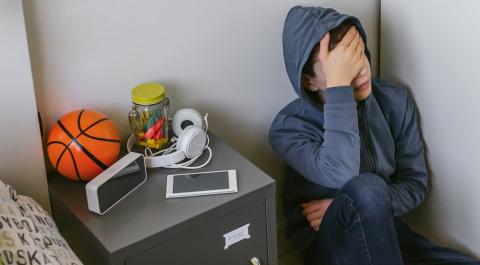Being there for your child is the most important thing you can do to help protect their mental health. The teenage years are a difficult time for everyone, but there are things you can do to help them have more ups than downs.
Teen emotions and feelings
In this short video, Child Psychologist Cathy Richards discusses teen emotions and feelings.
Tips for supporting your teen's mental health
Tip #1: Let them know that all feelings are okay
The teenage years are full of emotions. It can be a bit overwhelming for teenagers to deal with them all. One way to support them is to help them work out what they’re feeling and then help them accept these feelings. Let them know that all feelings are okay, even bad ones.
Tip #2: Pause and slow down
Asking them to take 10 minutes away from their screens and anything else they may be doing to use as ‘thinking time’ can help them deal with their emotions. They could spend this time reflecting on their day, thinking about what’s gone well and what hasn’t gone so well. They could think about things they’re grateful for, or practise breathing exercises. There are lots of suggestions on the MIND and Aye Feel websites on how to do this.
Tip #3: Help teens work through their problems
Knowing you’re there to help them work through any problems (rather than tell them what to do) helps them feel supported. If your teen is anxious about something, try working with them to figure it out. Ask them what they think they should do and what might happen. Try out the plan and then chat together about how it went. Be curious – what went well, what was a surprise and what would they like to try next time? This will help them remember how they solved the problem, so next time they’ll have more confidence.
At this age, the part of the brain that deals with future thinking isn’t fully formed yet, so by helping them think through problems and consider the possible outcomes of their actions, you’ll be helping them develop their brain.
Tip #4: Help them find other outlets for their feelings
Teens often struggle to communicate their feelings. Writing, drawing, or making music are good ways to help them express themselves. They also promote creativity and can give them an outlet in their life that they can enjoy. Our page on creative activities for teens has lots of suggestions of things they could try.
Tip #5: Encourage them to get outside
Getting outside is important for everyone's wellbeing. So try and ensure they stick their noses outside at least once a day, even if it’s only for a quick walk round the park. Our page on physical activity and getting outdoors has more suggestions.
If your teen has been withdrawn or angry, Matt Henderson from Learning through Landscapes explains how getting outside for a walk, a bike ride or a game can make a world of difference.
Tip #6: Encourage them to take care of themselves
Your teen may roll their eyes at the idea of ‘self-care’ – but it’s about much more than having a nice bath or doing yoga. Self-care is about finding the little everyday things that help you feel calm and grounded, and this can be different for everyone. So encourage your teen to listen to their feelings and find what helps them. You and your teen (or your whole family) could experiment with different things together, like:
- going for a short walk every day
- writing down your feelings (your teen can find tips for journalling on the BBC Bitesize website)
- trying some mindfulness exercises (read this from NHS Inform to find out more about mindfulness)
- doing something creative, like dancing, crafting, drawing, colouring in or making models out or play dough
- listening to favourite music
- baking or cooking
- chatting to a friend
- reading a book
- trying meditation (this article from the NHS shows you how to get started).
Tip #7: Encourage them to make a list of things that calm them
If your teen gets very upset, stressed or anxious, they may find it hard (or even impossible) to remember what to do to calm themselves down. So it’s a good idea to encourage them to make a list of the things that work best for them and keep it on their phone or in their wallet. For example, this could be:
- doing some breathing exercises
- oing a grounding exercise, like listing 5 things they can see, 4 things they can touch, 3 things they can hear, 2 things they can smell and 1 thing they can taste
- squeezing a stress ball or playing with a fidget toy
- doing an activity that calms them, like colouring, stretching, jumping up and down to burn energy, listening to music or chatting to a friend.
Tip #8: Give them a break
Teenagers are under a lot of pressure – to do well at school, to look good, to take part in activities, to have lots of friends, to have a girl or boyfriend, to think about their future… All this can be exhausting and overwhelming. So make sure your teen has time to relax, blow off steam or just sleep in!
If your teen feels they can’t take a break, encourage them simply to pause for a minute and take a breath or 2. These videos on the Mind website show how taking a short break to take a few breaths can really help if they’re feeling anxious or stressed.
Tip #9: Help them silence their inner critic
Teens can be really hard on themselves, so encourage them to speak kindly to themselves. Our page on helping teens build self-esteem has tips for shutting up that little voice in our heads that’s always criticising us.
Tip #10: Remember to praise them
Make sure you praise your teen for every attempt they make to look after their mental health. Practising self-care can be hard (that’s why we have to practise it!) so it’s important to let your teen know that you’re proud of them for trying, even if they don’t always achieve what they set out to achieve.
Tip #11: Help them make the most of social media
Sitting alone in their bedrooms scrolling through other people’s lives can make young people feel isolated and disconnected. Worrying about ‘likes’ and comments can dent confidence. And comparing themselves to images they see online can make them feel they’re not good enough – even though often these images aren’t a real reflection of people’s lives at all.
If you’re concerned that social media is making your teen’s life miserable, the solution isn’t to take their phone away or switch the Wi-fi off. Instead, try talking to them about what they’re looking at and how it makes them feel, and encouraging them to take a break.
There are lots of ways they can use social media to boost their confidence, connect with like-minded people and discover new ideas. Our page on making the most of social media has tips to help.
Tip #12: Let them know you're there for them
Your teen may not always feel like talking to you about their feelings (or about anything at all!). But letting them know you’re there if and when they need you will help them feel supported and loved.
You could also remind them that if they don’t want to talk to you they can always talk to another trusted adult, or anonymously to a helpline. Our page on getting support when you’re raising a teen lists organisations your teen can talk to, including Childline and The Mix.
More ways to support your teen's mental health
For a more in-depth look at how you can support your teen’s mental health, you can sign up for a free course from NHS Scotland and SilverCloud. The course ‘Supporting an anxious teen’ helps parents and carers support teenagers to deal with worry and anxiety, while also learning helpful strategies to tackle their own anxiety. In the course you’ll learn how anxiety affects teens, and how to help them manage anxiety. It also includes practical tools like breathing exercises and relaxation activities.
You can find out more about the courses available here and sign up for free using the code Scotland2020.
If you're concerned about your teen's mental health or wellbeing you can find out where to get help and support here.
 Activities & Play
Activities & Play Behaviour
Behaviour Childcare
Childcare Development & Growing Up
Development & Growing Up Family, Friends & Relationships
Family, Friends & Relationships Feeding Your Baby
Feeding Your Baby Food & Eating
Food & Eating Health & Safety
Health & Safety Mental Health & Wellbeing
Mental Health & Wellbeing Money & Work
Money & Work Online Behaviour & Safety
Online Behaviour & Safety Pregnancy & First Days
Pregnancy & First Days School & Education
School & Education Sleep
Sleep












 Behaviour
Behaviour
 Sleep
Sleep